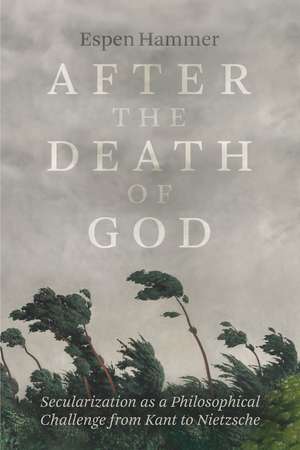After the Death of God: Secularization as a Philosophical Challenge from Kant to Nietzsche
Autor Espen Hammeren Limba Engleză Paperback – 22 mar 2025
The secularization thesis, which held that religious belief would gradually yield to rationality, has been thoroughly debunked. What, then, can we learn from philosophers for whom the death of God seemed so imminent? In this book, Espen Hammer offers a sweeping analysis of secularization in nineteenth-century German philosophy, arguing that the persistence of religion (rather than its absence) animated this tradition. Hammer shows that Kant, Hegel, Feuerbach, Marx, and Nietzsche, each in their own way, sought to preserve and transform religion’s ethical and communal aspirations for modern life. A renewed appreciation for this tradition’s generous thought, Hammer argues, can help us chart a path through needlessly destructive conflicts between secularists and fundamentalists today.
Preț: 224.33 lei
Nou
Puncte Express: 336
Preț estimativ în valută:
42.93€ • 46.62$ • 36.06£
42.93€ • 46.62$ • 36.06£
Carte nepublicată încă
Doresc să fiu notificat când acest titlu va fi disponibil:
Se trimite...
Preluare comenzi: 021 569.72.76
Specificații
ISBN-13: 9780226838502
ISBN-10: 0226838501
Pagini: 240
Dimensiuni: 152 x 229 x 20 mm
Greutate: 0.33 kg
Ediția:First Edition
Editura: University of Chicago Press
Colecția University of Chicago Press
ISBN-10: 0226838501
Pagini: 240
Dimensiuni: 152 x 229 x 20 mm
Greutate: 0.33 kg
Ediția:First Edition
Editura: University of Chicago Press
Colecția University of Chicago Press
Notă biografică
Espen Hammer is professor of philosophy at Temple University. He has published numerous books, including Adorno’s Modernism: Art, Experience, and Catastrophe.
Cuprins
Preface
Introductory Remarks
Chapter One Secularization and Modernity
Chapter Two The Kantian Compromise
Chapter Three Hegel’s Rescue Mission
Chapter Four A Social Critique of Religion: Feuerbach and Marx
Chapter Five Nietzsche and the Overcoming of Christianity
Concluding Remarks
Bibliography
Index
Introductory Remarks
Chapter One Secularization and Modernity
Chapter Two The Kantian Compromise
Chapter Three Hegel’s Rescue Mission
Chapter Four A Social Critique of Religion: Feuerbach and Marx
Chapter Five Nietzsche and the Overcoming of Christianity
Concluding Remarks
Bibliography
Index
Recenzii
“In this elegant and compelling book, Hammer guides readers through a new reading of philosophical history: from Kant forward, he argues, the modern philosophical canon has directed its attention to religion with a twofold gesture of critique and rescue. Through exceptionally illuminating close readings, Hammer helps us to see in this framework a truly insightful and graceful new answer to an important question: What remains to religion after what Nietzsche called the death of God?”
“Hammer offers a revelatory treatment of the theme of secularization in the post-Kantian period. In the narrative Hammer presents, religious impulses are not simply discarded with the onset of secularization but are instead transformed and preserved. Specialists and nonspecialists alike will benefit from engaging with his account.”
